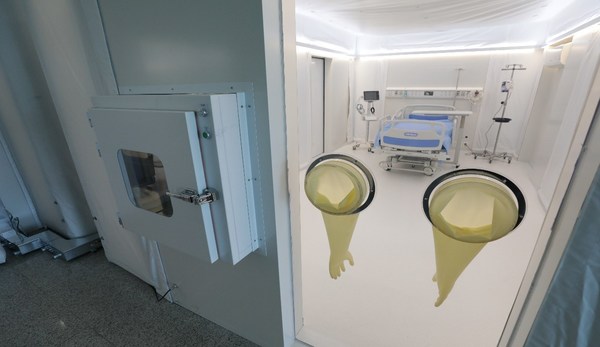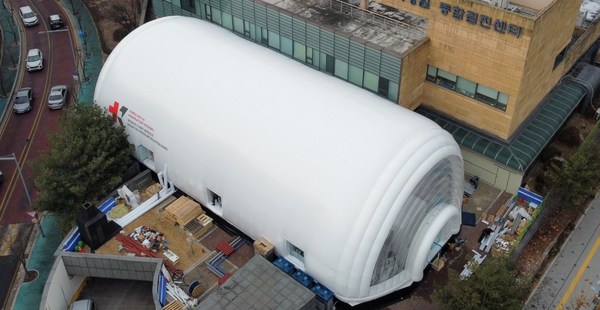DAEJEON, South Korea, Jan. 7, 2021 /PRNewswire/ -- A team from KAIST has developed a low-cost and ready-for-rapid-production negative pressure room called a Mobile Clinic Module (MCM).
The MCM is expandable, moveable, and easy to store through a combination of negative pressure frames, air tents, and multi-function panels.
The MCM expects to quickly meet the high demand for negative pressure beds in the nation and eventually many other countries where the third wave of COVID-19 is raging. The module is now ready to be rolled out after a three-week test period at the Korea Cancer Center Hospital. For more at https://youtu.be/TMEthF7lRHI.
Professor Tek-Jin Nam's team swung into action, rapidly working together with researchers, engineers with expertise in mechanical design, and a team of clinical doctors to complete the MCM as one of KAIST's New Deal R&D initiatives launched in last July.
Professor Nam cites 'expandability' as the key feature of the MCM. Eventually, it will serve as both a triage unit and bridge center in emergency medical situations.
"The module is a very efficient and versatile unit building system. It takes approximately two hours to build the basic MCM unit, which comprises four negative pressure bed rooms, nurse's station, locker room, and treatment room. We believe this will significantly contribute to relieving the drastic need for negative pressure beds and provide a place for monitoring patients with moderate symptoms," said Professor Nam.
"It will also be helpful for managing less-severe patients who need to be monitored daily in quarantined rooms or as bridge stations where on-site medical staff can provide treatment and daily monitoring before hospitalization. These wards can be efficiently deployed either inside or outside existing hospitals."
The research team specially designed the negative pressure frame to ensure safety level A for the negative pressure room, which is made of a multi-function panel wall and roofed with an air tent. The multi-function panels can hold medical appliances such as ventilators, oxygen, and bio-signal monitors.
Positive air pressure devices supply fresh air from outside the tent. An air pump and controller maintain air beam pressure, while filtering exhausted air. An internal air information monitoring system efficiently controls room air pressure and purifies the air.
While a conventional negative pressure bed is reported to cost approximately 3.5 billion KRW (50 billion won for a ward), this module is estimated to cost 0.75 billion won each (10 billion won for a ward), cutting the costs by approximately 80%.
The MCM is designed to be easily transported and relocated due to its volume, weight, and maintainability. This module requires only one-fourth of the volume of existing wards and takes up approximately 40% of their weight. The unit can be transported in a 40-foot container truck.
We believe this will significantly contribute to relieving the drastic need for negative pressure beds and provide a place for monitoring patients with moderate symptoms. We look forward to the MCM upgrading epidemic management resources around the world."
Professor Nam's team is also developing antiviral solutions and devices such as protective gear, sterilizers, and test kits under the KAIST New Deal R&D Initiative that was launched to promptly and proactively respond to the epidemic. More than 45 faculty members and researchers at KAIST are collaborating with industry and clinical hospitals to develop the antiviral technology that will improve preventive measures, diagnoses, and treatment. (END)
About KAIST
KAIST is the first and top science and technology university in Korea. KAIST was established in 1971 by the Korean government to educate scientists and engineers committed to the industrialization and economic growth of Korea.
Since then, KAIST and its 64,739 graduates have been the gateway to advanced science and technology, innovation, and entrepreneurship. KAIST has emerged as one of the most innovative universities with more than 10,000 students enrolled in five colleges and seven schools including 1,039 international students from 90 countries.
On the precipice of its semi-centennial anniversary in 2021, KAIST continues to strive to make the world better through the pursuit in education, research, entrepreneurship, and globalization.
Media Contact
Younghye Cho
kaistpr@kaist.ac.kr
younghyecho@kaist.ac.kr

The view of ready-for-rapid-production negative pressure room called a Mobile Clinic Module (MCM) developed by KAIST. The MCM expects to quickly meet the high demand for negative pressure beds in the nation where the third wave of COVID-19 is raging. (Photo credit by KAIST)

The MCM ward (450 m2 or 15m X 30m) accommodates four negative pressure bed rooms, nurse station, locker room, and treatment room. (Photo credit by KAIST)
![]() View original content to download multimedia:http://www.prnewswire.com/news-releases/kaist-mobile-clinic-module-to-fill-negative-pressure-ward-shortage-301201846.html
View original content to download multimedia:http://www.prnewswire.com/news-releases/kaist-mobile-clinic-module-to-fill-negative-pressure-ward-shortage-301201846.html